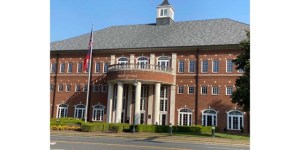Civil War anniversary: So who was Gen. John B. Gordon? And why is his statue on the Georgia Capitol grounds?
Published 11:22 pm Saturday, September 13, 2014
Gen. John B. Gordon’s rhetoric bolstered his career as a Confederate soldier and Georgia politician. His own words tell his story best:
“The outbreak of war found me in the mountains of Georgia, Tennessee and Alabama, engaged in the development of coal-mines. This does not mean that I was a citizen of three states; but it does mean that I lived so near the lines that my mines were in Georgia, my house in Alabama, and my post-office in Tennessee. The first company of soldiers, therefore, with which I entered the service was composed of stalwart mountaineers from three states. I had been educated for the bar and for a time practiced law in Atlanta. In September 1854, I had married Miss Fanny Haralson, third daughter of Gen. Hugh A. Haralson, of LaGrange, Georgia. The wedding occurred on her seventeenth birthday and when I was but twenty-two. We had two children, both boys. The struggle between devotion to my family on the one hand and duty to my country on the other was most trying to my sensibilities. My spirit had been caught up by the flaming enthusiasm that swept like a prairie-fire through the land, and I hastened to unite with the brave men of the mountains in organizing a company of volunteers. But what was I to do with the girl-wife and the two little boys? The wife and mother was no less taxed in her effort to settle this momentous question. But finally yielding to the promptings of her own heart and to her unerring sense of duty, she ended doubt by announcing that she intended to accompany me to the war, leaving her children with my mother and faithful “Mammy Mary.” I rejoiced at her decision then, and had still greater reasons for rejoicing at it afterward, when I felt through every fiery ordeal the inspiration of her near presence, and had, at need, the infinite comfort of her tender nursing.” Thus Gen. John B. Gordon began his “Reminiscences of the Civil War.”
Trending
John B. Gordon was born in Upson County, Ga., in 1832 and later resettled with his family in the Gordon Springs area of western Whitfield and eastern Walker counties. As a boy, he studied at Gordon Springs and then at the Pleasant Green Academy in LaFayette. On his volunteering as a soldier in the Confederate Army, his company of Alabama volunteers elected him captain. He subsequently rose in rank to major general, commanding the Confederate 2nd Corps under Robert E. Lee. He had a natural ability to command and developed a brilliant military record with the Army of Northern Virginia. Gordon’s biographer, Ralph Lowell Eckert, reports that “despite his lack of formal military training, Gordon displayed boldness, vigilance, aggressiveness and a sound military sense on all of his battlefields. His courage, moral resolve and audaciously offensive spirit made him a superb combat officer. … At Appomattox Courthouse, Gordon rode at the head of the Confederate surrender column — an honor bestowed upon him because of his superb service during the war’s last year. In his final address to his troops, he appealed to them to return home in peace and to aid in rebuilding the South and the nation.”
A way with words
Gordon had superb oratorical talent. Eckert reports that Gordon’s successor as commander-in-chief of the United Confederate Veterans, Stephen Dill Lee, observed, “His (Gordon’s) imposing and magnificent soldierly bearing, coupled with his splendid ringing voice and magnetic oratory gave him a God-given talent, not equaled or possessed by any other officer in either army — that of getting in front of his troops, and in a few ringing appeals, inspiring them almost to madness, and being able to lead them into the very Jaws of death.” His outstanding oratorical abilities persuaded one soldier that he never again wanted to hear Gordon speak before going into action “because he makes me feel like I could storm h—ll.”
Gordon had a robust self-image. He argued that the South could have won the Civil War had his superior generals (especially Jubal A. Early) taken his advice more frequently and earlier. Was he right? James M. McPherson’s authoritative “Battle Cry of Freedom” concludes that several contingent outcomes of the Civil War were possible based on different outcomes of a battle or two. So who knows?
Through the years, we have forgotten the horror of the Civil War. In his “Reminiscences,” Gordon recounts massive casualties in numerous battles (none more so than at Chickamauga). He stood beside several persons as they were shot. Several horses were shot out from under him. He praised the courage and valor of the troops as they charged into almost certain slaughter. Although he wrote of the honor and glory of the dedicated and brave troops, his description of the slaughter was appalling.
In his swaggering account of his own wounding at Antietam, Gordon wrote: “The first volley from the Union lines in my front sent a ball through the brain of the chivalric Colonel Tew, of North Carolina, to whom I was talking, and another ball through the calf of my right leg. On the right and the left my men were falling under the death-dealing crossfire like trees in a hurricane. The persistent Federals, who had lost so heavily from repeated repulses, seemed now determined to kill enough Confederates to make the debits and credits of the battle’s balance-sheet more nearly even. Both sides stood in the open at short range and without the semblance of breastworks, and the firing was doing a deadly work. Higher up in the same leg I was again shot; but still no bone was broken. … When later in the day the third ball pierced my left arm, tearing asunder the tendons and mangling the flesh, they caught sight of the blood running down my fingers, and these devoted and big-hearted men, while still loading their guns, pleaded with me to leave them and go to the rear, pledging me that they would stay there and fight to the last. … A fourth ball ripped through my shoulder, leaving its base and a wad of clothing in its track. … I had gone but a short distance when I was shot down by a fifth ball, which struck me squarely in the face, and passed out, barely missing the jugular vein. I fell forward and lay unconscious with my face in my cap; and it would seem that I might have been smothered by the blood running into my cap from this last wound but for the act of some Yankee, who, as if to save my life, had at a previous hour during the battle, shot a hole through the cap, which let the blood out.”
Trending
Promoting reconciliation
After the war, Georgians elected Gordon three times to the U.S. Senate and twice as governor. In these positions, he sought to reconcile the North and the South, to restore the South’s self-image, to re-establish a unified nation and to allay the rancorous feelings brought about by strife. As a conspicuous senator from the South, he was the go-to person with whom Northern senators could consult and negotiate. He lectured throughout the nation on the Civil War, giving even-handed praise to both sides, thus promoting reconciliation. He worked continually to get the restrictions of Reconstruction removed from the South — working for the removal of Northern occupying forces and the restoration of political rights to all Southerners. In his writings, he contributed to the canonization of Robert E. Lee, whom he knew personally and greatly admired.
As well as glory, Gordon’s life was full of controversy in political and business dealings. But we seek here to remember his positive contributions and the esteem his fellow Americans held for him. As Eckert reports at Gordon’s death: A saddened President Theodore Roosevelt expressed his pride in counting Gordon among his friends, for a “more gallant, generous and fearless gentleman and soldier has not been seen by our country” — high praise indeed for a man who less than a half-century before had fought to dissolve the union that Roosevelt governed.
Gordon completed his “Reminiscences of the Civil War” in 1903 with the following paragraph, which summarized his view of the Civil War and continued his efforts at reconciliation and reunification: “The unseemly things which occurred in the great conflict between the states should be forgotten, or at least forgiven, and no longer permitted to disturb complete harmony between the North and the South. American youth in all sections should be taught to hold in perpetual remembrance all that was great and good on both sides; to comprehend the inherited convictions for which saintly women suffered and patriotic men died; to recognize the unparalleled carnage as proof of unrivalled courage; to appreciate the singular absence of personal animosity and the frequent manifestation between those brave antagonists of a good-fellowship such as had never before been witnessed between hostile armies. It will be a glorious day for our country when all the children within its borders shall learn that the four years of fratricidal war between the North and the South was waged by neither with criminal or unworthy intent, but by both to protect what they conceived to be threatened rights and imperiled liberty; that the issues which divided the sections were born when the Republic was born, and were forever buried in an ocean of fratricidal blood. We shall then see that, under God’s providence, every sheet of flame from the blazing rifles of the contending armies, every whizzing shell that tore through the forests at Shiloh and Chancellorsville, every cannon-shot that shook Chickamauga’s hills or thundered around the heights of Gettysburg, and all the blood and tears that were shed are yet to become contributions for the upbuilding of American manhood and for the future defence of American freedom. The Christian Church received its baptism of Pentecostal power as it emerged from the shadows of Calvary and went forth to its world-wide work with greater unity and a diviner purpose. So the Republic, rising from its baptism of blood with a national life more robust, a national union more complete, and a national influence ever widening, shall go forever forward in its benign mission to humanity.”
Sources: Gen. John B. Gordon, “Reminiscences of the Civil War” (1903); Ralph Lowell Eckert, “John Brown Gordon: Soldier, Southerner, American” (1989); James M. McPherson, “Battle Cry of Freedom: The Civil War Era” (1988).
This article is part of a series of stories about Dalton and life in Dalton during the Civil War. The stories run on Sunday and are provided by the Dalton 150th Civil War Commission. To find out more about the commission, go to dalton150th.com. If you have material that you would like to contribute for a future article contact Robert Jenkins at (706) 259-4626 or robert.jenkins@robertdjenkins.com.





